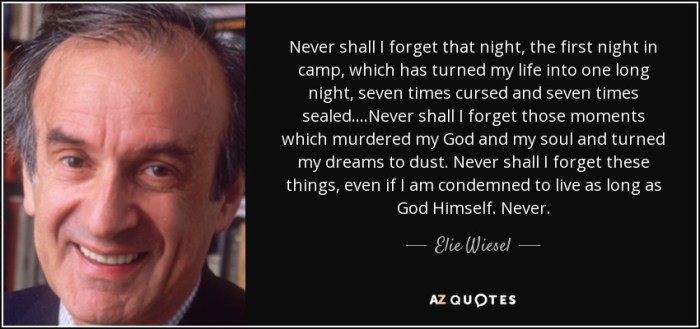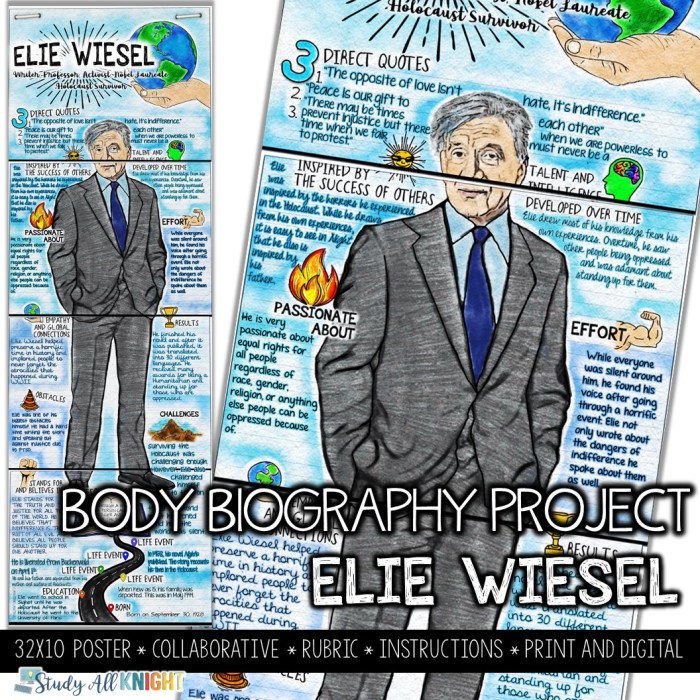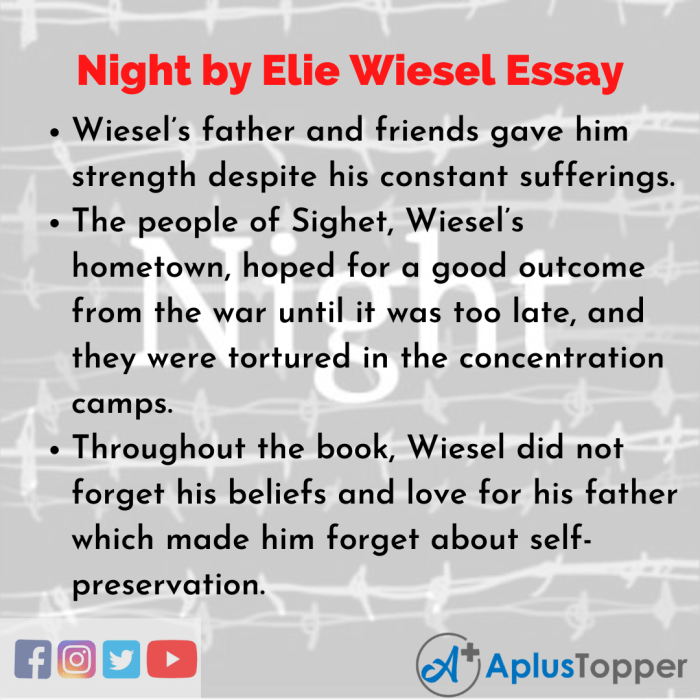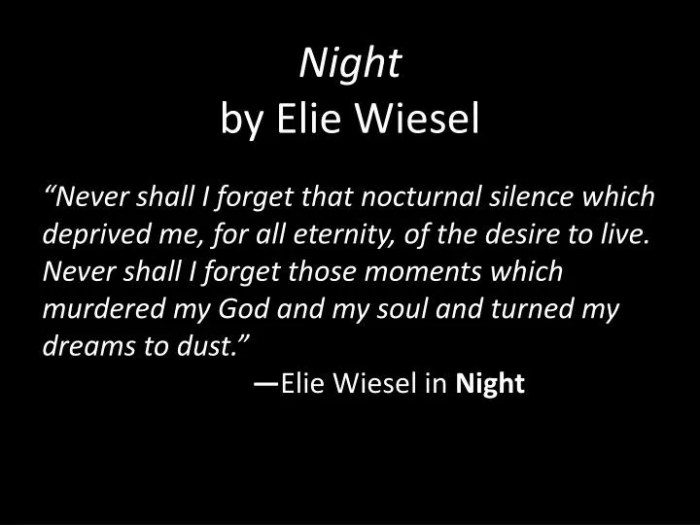The Night Poem by Elie Wiesel, a poignant and evocative work, transports readers into the depths of human suffering and resilience during the Holocaust. With vivid imagery and profound insights, Wiesel’s poem unveils the horrors and atrocities of this dark period in history.
Through the lens of Wiesel’s personal experiences as a Holocaust survivor, Night Poem explores the profound themes of loss, suffering, and the glimmer of hope that persists even in the face of unimaginable adversity.
Thematic Analysis of “Night”
Elie Wiesel’s “Night” is a profound and harrowing exploration of the horrors of the Holocaust. Through the eyes of the young Eliezer, the poem exposes the depths of human suffering, the fragility of hope, and the enduring power of memory.
Loss
Loss permeates every aspect of “Night.” Eliezer witnesses the death of his family, friends, and countless others. The loss of his loved ones leaves an unfillable void within him, a constant reminder of the brutality of the Nazi regime.
“My father had been taken in front of my eyes; my mother and my sister had been taken in front of my eyes. But I had not cried. Deep inside me, something had already died.”
Elie Wiesel’s Night is a powerful and haunting memoir that explores the horrors of the Holocaust. The poem is filled with vivid imagery and symbolism, and it offers a unique perspective on one of the darkest chapters in human history.
If you’re interested in learning more about words that contain the letters “f o s s i l,” here’s a link to a list of some examples. Night is a powerful reminder of the importance of remembering the past and fighting against hatred and intolerance.
Suffering
The suffering endured by the prisoners in “Night” is both physical and psychological. They are subjected to starvation, beatings, and unimaginable horrors. The conditions in the concentration camps are so extreme that they push the prisoners to the brink of their humanity.
“We were not far from the crematorium. To the left I saw a group of naked men. They were the living dead, doomed men whose existence was no more than an agony.”
Hope, Night poem by elie wiesel
Despite the overwhelming darkness of “Night,” a flicker of hope persists. Eliezer clings to the belief that there is still good in the world, even in the face of such evil. He finds solace in his faith and in the small acts of kindness that he witnesses.
“In spite of everything, I still believe that people are good at heart. I still believe that there is much that is good in the world.”
Imagery and Symbolism

Elie Wiesel’s poem “Night” is characterized by its vivid imagery and rich symbolism, which work together to convey the horrors of the Holocaust and the profound impact it had on the speaker’s life.
The poem is replete with images of darkness, cold, and violence, which create a sense of foreboding and despair. The speaker describes the “black sky” and the “cold wind” that “howls like a beast,” evoking the harsh and unforgiving conditions of the concentration camps.
Symbolism of Night
The title of the poem itself, “Night,” is a powerful symbol of the darkness and suffering endured by the victims of the Holocaust. The speaker refers to the “night” as a “time of terror” and a “time of death,” suggesting that it represents the absence of hope and the horrors that occurred during this period.
Symbolism of Fire
In contrast to the darkness, the poem also contains images of fire, which symbolizes both destruction and hope. The speaker describes the “flames” that “dance in the wind” and the “burning bodies” that fill the air, representing the horrors of the Holocaust and the loss of countless lives.
However, the poem also suggests that fire can represent hope and renewal. The speaker speaks of the “flame of memory” that will continue to burn, even in the face of adversity, suggesting that the memory of the Holocaust will live on and serve as a warning against future atrocities.
Structure and Form: Night Poem By Elie Wiesel

The poem “Night” by Elie Wiesel is written in a free verse form, meaning it does not follow a specific rhyme scheme or meter. However, the poem is still structured in a way that creates a sense of rhythm and flow.
Stanzas and Line Breaks
The poem is divided into three stanzas, each of which focuses on a different aspect of the Holocaust. The first stanza describes the arrival of the prisoners at the concentration camp, the second stanza describes the horrors they experience there, and the third stanza describes their liberation.
The use of line breaks in the poem helps to create a sense of urgency and tension. The short, choppy lines in the first stanza convey the chaos and confusion of the prisoners’ arrival at the camp, while the longer, more flowing lines in the third stanza convey the sense of relief and hope that they feel after being liberated.
Imagery and Symbolism
Wiesel uses powerful imagery and symbolism throughout the poem to convey the horrors of the Holocaust. For example, he describes the prisoners as “skeletons” and “walking corpses,” and he compares the camp to a “factory of death.” These images help to create a vivid and unforgettable picture of the suffering that the prisoners endured.
Figurative Language
Wiesel also uses a variety of figurative language in the poem, including metaphors, similes, and personification. For example, he describes the prisoners as “puppets” and “marionettes,” and he compares the camp to a “machine.” These figures of speech help to emphasize the dehumanizing effects of the Holocaust.
Biographical Context
Elie Wiesel was a Romanian-born Jewish writer, philosopher, and Nobel Peace Prize laureate. His most famous work, “Night,” is a semi-autobiographical account of his experiences as a teenager during the Holocaust.
Wiesel was born in Sighet, Romania, in 1928. In 1944, when he was 15 years old, the Nazis invaded Hungary and deported Wiesel and his family to Auschwitz concentration camp. Wiesel spent the next year in various concentration camps, including Buchenwald, where he was liberated by American forces in 1945.
Wiesel’s Experiences in the Holocaust
- Witnessing the death of his family and friends
- Being subjected to starvation, torture, and beatings
- Experiencing the horrors of the gas chambers
These experiences had a profound impact on Wiesel, and they shaped the themes and content of “Night.” In the book, Wiesel explores the themes of faith, suffering, and the Holocaust’s impact on the human soul.
Historical Context

The Holocaust, a horrific period of genocide during World War II, witnessed the systematic extermination of millions of Jews and other minorities by the Nazi regime. Its impact on the world was profound, leaving an indelible scar on human history.
The Holocaust and its Impact
- The Holocaust resulted in the deaths of an estimated six million Jews, representing two-thirds of the Jewish population of Europe.
- The Nazis also targeted other groups, including Roma, homosexuals, and political dissidents, resulting in the deaths of millions more.
- The Holocaust had a devastating impact on Jewish communities worldwide, leading to the displacement and emigration of survivors.
- The Holocaust raised profound questions about human morality, ethics, and the potential for evil in society.
Reflection in “Night”
Elie Wiesel’s poem “Night” powerfully reflects the horrors and atrocities of the Holocaust.
- Wiesel’s vivid imagery and stark language convey the unimaginable suffering and brutality endured by the victims.
- The poem explores themes of faith, hope, and the loss of innocence in the face of such extreme adversity.
- “Night” serves as a testament to the resilience of the human spirit and the importance of remembering and learning from the past.
Critical Reception

Elie Wiesel’s “Night” has garnered widespread critical acclaim since its publication in 1958. Critics have praised the book for its unflinching honesty, its searing indictment of the Holocaust, and its powerful prose.
Impact on Literature
“Night” has had a profound impact on literature, inspiring countless other works that explore the Holocaust and the human condition. It is considered a classic of Holocaust literature and has been translated into more than 30 languages.
Impact on Society
“Night” has also had a significant impact on society. It has helped to raise awareness of the Holocaust and has played a vital role in Holocaust education. The book has been used in schools and universities around the world to teach students about the horrors of the Holocaust and the importance of fighting against hatred and intolerance.
Answers to Common Questions
What is the main theme of Night Poem by Elie Wiesel?
The main theme of Night Poem is the exploration of loss, suffering, and the enduring power of hope amidst the horrors of the Holocaust.
How does Wiesel use imagery and symbolism in Night Poem?
Wiesel employs vivid imagery and potent symbolism to convey the physical and emotional anguish experienced during the Holocaust, creating a visceral and unforgettable reading experience.